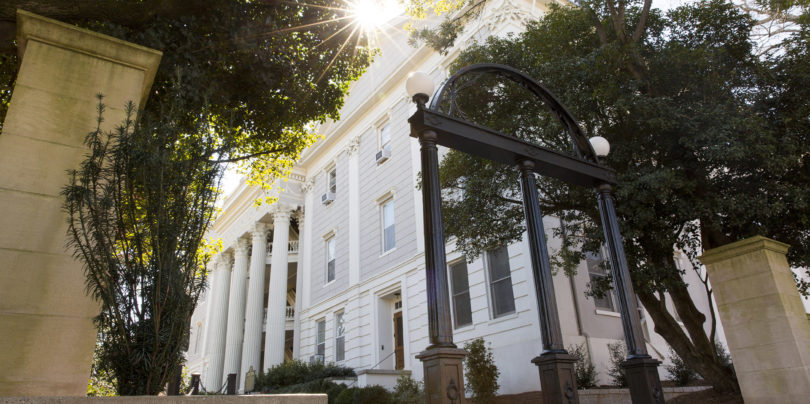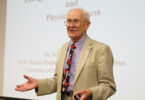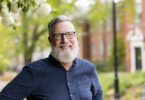Active learning has been chosen as the focus of the Quality Enhancement Plan for the University of Georgia. The QEP is an initiative focused on enhancing undergraduate education that is developed and launched as part of the university’s reaffirmation of accreditation by the Southern Association of Colleges and Schools Commission on Colleges. UGA’s accreditation by SACSCOC allows students to obtain federal financial aid and allows UGA researchers to apply for federally funded grants. Reaffirmation occurs every 10 years.
Columns recently spoke with Linda Kirk Fox, dean of the College of Family and Consumer Sciences and chair of the QEP Development and Implementation Committee, and Henry Munneke, Dorsey Distinguished Chair of Real Estate in the Terry College of Business and chair of the QEP Topic Selection Committee, about the value of active learning and next steps for the QEP. Munneke will chair the QEP Development and Implementation Committee upon Fox’s retirement in August.
Columns: For those who have not been through reaffirmation of accreditation, take readers through the process and how the Quality Enhancement Plan fits in.
Fox: We know that with the reaffirmation of the university’s accreditation, there is a stand-alone component called the Quality Enhancement Plan, and it demonstrates what the institution’s priorities are for enhancing the learning success for our students. The goal of the Quality Enhancement Plan is to show that the institution is always changing and improving and directing significant efforts toward the enhancement of student learning. It’s a five-year plan, and UGA is putting the plan in place in two steps. First was identifying what would be the quality enhancement goal and the topic through the Topic Selection Committee. Then, it is handed off to my committee to develop.
Columns: How did the QEP Topic Selection Committee decide on active learning?
Munneke: Part of President Morehead’s charge to the QEP Topic Selection Committee, way back in January 2020, was that the topic must emerge from the existing planning processes, and it must also reflect UGA’s commitment to excellence in undergraduate education. Based on this charge, the committee reviewed the 2025 Strategic Plan and the 2017 Taskforce on Student Learning findings in an attempt to identify possible QEP topics. The work of the faculty who developed these documents allowed us to have a bit of a head start in narrowing down the potential number of topics to a handful we would research further. The committee then interviewed various individuals at the university who are involved in the short list of topic areas to gather information and provide a basis for our discussion.
The committee narrowed in fairly quickly on the topics of active learning, experiential learning, service learning—all topics found in prior planning processes. After much deliberation, in May 2020, the committee selected active learning, believing it was the area that would benefit most from being the focus of the QEP.
Columns: How do you define active learning?
Fox: That was one of the first tasks the Development and Implementation Committee took on, with a lot of leadership from the Center for Teaching and Learning, which already provides active learning training. As a full committee, we identified what we’re calling a framework for active learning, because it’s hard to put it all in one sentence. Active learning is deliberate and encompasses the conditions in which all students are engaged in their own learning. That engagement has several components—it includes students reflecting on what they’re learning while they’re learning, and it includes applying the knowledge, not just transferring the knowledge from faculty to students. We also want to make sure that faculty receive enhanced training and that the students themselves are better prepared as participants in an active learning environment.
Columns: The Topic Selection Committee’s proposal included three components: programming for instructors, programming for students, and classroom reconfiguration and renovation. How did the committee decide on the three components?
Munneke: Well, the instructor and student programming seem like obvious components, but you can’t neglect the environment in which these components interact—the classroom. We know the training of the instructors is extremely important. We want to make sure the people at the front of the classroom are able to enhance what they do through active learning. It’s also important to be able to say to students, “Your lessons and classrooms might look a little different, and here’s why they’re different.”
We want faculty to buy in to active learning and understand the benefits research has shown active learning provides. We also want students to understand that this is well thought out, and it’s something that is going to enhance their learning, not only in the classroom, but also hopefully throughout their lives.
Columns: How do these components build on or expand what’s already being done at UGA?
Fox: It builds on what we know are some of the successes already for the Center for Teaching and Learning through the Active Learning Summer Institute, but based on the Topic Selection Committee’s recommendation, we know we need it year-round. We want more opportunities for training for all who provide instruction—graduate teaching assistants, instructors, lecturers, clinical faculty and tenured faculty. Ultimately, we want faculty to be able to make active learning recommendations related to their own curriculum.
Columns: What steps is the QEP Development and Implementation Committee taking to turn that proposal into an active learning program?
Fox: Well, this 33-member committee includes faculty, graduate students, undergraduate students and staff. We have a lot of great people at the table, and we’re designing the program through subcommittees. In early May, we’ll present our vision to President Morehead for refinements. Then it will go to the wider accreditation leadership team. We should have a draft plan in August and a more finalized plan around November. We’ll continue to shape the design—it’s a living document.
Columns: What kinds of elements are being considered for inclusion in the program?
Fox: At a higher level, the larger framework is awareness, preparation for instructors and students, and then skill development. We’re also looking to include direct support, like student and faculty mentors. All of these measures will go toward building the quality and quantity of active learning opportunities.
Columns: What kinds of changes should faculty expect to see?
Fox: I think we’ll see the transformation of spaces that support the kinds of group learning that can occur with active learning and the technology that could support that active learning. We know that that environment is already changing on campus, and we want to see that in more places. It helps when faculty who incorporate active learning get matched with a classroom space in which they can then be most effective.
Columns: What kinds of changes should students expect to see?
Munneke: I always think of active learning as a spectrum of potential opportunities within the classroom. So, I think that you’re going to see that faculty members are going to become more aware of that spectrum and be able to more effectively use the tools of active learning. We want students to know they’re going to be engaged in the classroom. They’ll be asked to be involved and think and contribute.
Columns: Is there a particular student population you’re hoping to reach with the program?
Fox: We want the opportunities to be there so that sometime during a student’s life at UGA, they will have active learning in their curriculum. We want them to bump into active learning while they’re here. We’re not seeing this as a requirement, but we want it to be inclusive. We do see some deliberate opportunities for students in key transition points, such as transfer students and second-year students preparing for more in-depth courses in their majors.
Columns: What are the next steps for the QEP?
Fox: The QEP is intended to be informed by a site review team as part of the accreditation process, so it is not done and publicly implemented as rapidly as one might think. That site visit will be in spring 2022. So, fall 2022 is roughly the timeframe for rolling it out. Now, that doesn’t mean that we’re not continuing to offer active learning trainings and development materials in the meantime. There are a lot of partnerships and linkages on this campus we’ll continue to build.
Columns: Dean Fox, what does it mean to wrap up your time at UGA with the leadership of this project?
Fox: It’s exciting and bittersweet, but I love building things for the future. All universities have transitions, and I love these kinds of roles where I can make an impact.







